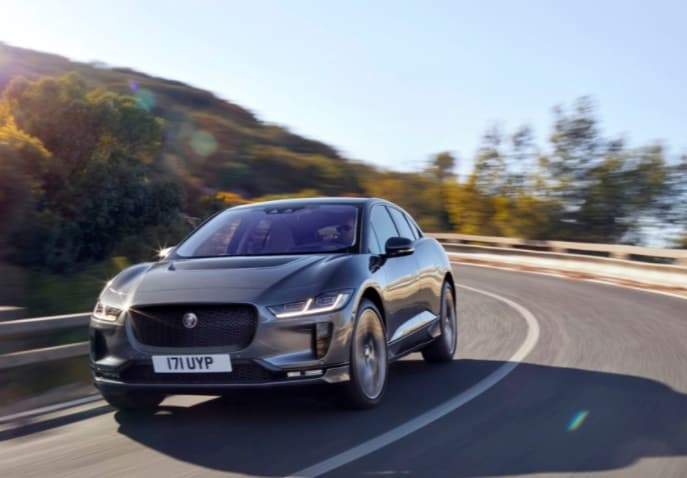
For far too long, Tesla has had the high-end electric vehicle market all to itself. But that’s set to change in the next couple of years. Some of the more forward-thinking traditional automakers have gotten their act together, and the first out of the gate will be Jaguar with its new I-Pace SUV. And make no mistake about it: the I-Pace is gunning squarely at Tesla when it comes to the EV’s vital statistics. What’s more, with a starting price of $69,500 it’s going to significantly undercut both the Model S and Model X.
We first saw the I-Pace as a concept car at the 2016 Los Angeles Auto Show. Since then, it has felt like a familiar face, appearing at every major auto show in 2017. There was even news last December that a one-make racing series will support Formula E in 2018. But we didn’t actually see the production version until Jaguar revealed it last week in Austria. US pricing was revealed on Tuesday morning.
Visually, the production I-Pace looks all but identical to the show car. And it’s quite the looker, blending elements from the stillborn C-X75 hybrid hypercar and Jaguar’s conventionally powered F-Pace and E-Pace SUVs. Although the I-Pace’s footprint is similar to the F-Pace, Jaguar says that the cab-forward design and the advantages of an EV powertrain layout allow for a spacious interior more in keeping with a vehicle the next size up.
“The I-PACE’s electric powertrain offered us unprecedented design freedom,” said Ian Callum, Jaguar director of design. “Starting with a clean sheet enabled the dramatic cab-forward profile, unique proportions, and exceptional interior space—yet it is unmistakably a Jaguar. We wanted to design the world’s most desirable EV, and I’m confident we’ve met that challenge.”
It’s not just a pretty face, either. The design gives the I-Pace a relatively low drag coefficient (Cd) of 0.29, although that number is somewhat meaningless without taking into account the frontal area (CdA), a figure car companies seem loath to give out.
The I-Pace’s design manages airflow around the vehicle to minimize drag, and, at speeds above 65mph, the air suspension will lower it by 0.4 inches (10mm) to help things further. Cold air for the battery comes from the front grille, which also channels air up and over the top of the roofline. And there are active vanes that can open up in the front bumper to boost airflow to the battery and climate control system if necessary.
Winter testing north of the Arctic Circle means the EV will handle temperatures down to -40 (pick your units, they’re the same!) and the thermal management strategy uses active heating when cold, a “cooling system” at moderate temperatures, with a refrigeration unit linked to the air conditioning system pitching in at high temperatures.
Did someone mention Tesla?
If there was any doubt that Jaguar is targeting the Tesla crowd, consider the I-Pace’s headline numbers. It has a 90kWh battery pack comprising 432 nickel manganese cobalt lithium-ion cells. That should give the EV about 240 miles of range under the EPA’s testing (although it has yet to be rated). Jaguar says that the I-Pace will charge from zero to 80 percent in about 40 minutes using a 100kW charger, or 85 minutes on a 50kW unit.
At-home charging using a 7kW charger should take just over 10 hours to get from empty to 80 percent and just under 13 hours to completely recharge a depleted battery. Jaguar notes that most Americans drive fewer than 30 miles (48km) a day, and even Tesla CEO Elon Musk says EV owners should charge at home. However, unlike Porsche, the company has not made any announcement about building out a network of fast chargers here in the US.
Then there’s the performance. The I-Pace is a twin-motor design; each motor is rated at 147kW (197hp) and 350Nm (258ft-lbs), although, as with the dual-motor Teslas, combined output is limited, in this case to 295kW (394hp) and 694Nm (512ft-lbs). From a standing start, the I-Pace will hit 60mph in 4.5 seconds (0-100km/h takes 4.8 seconds), before topping out at 124mph (200km/h). It slows with similar aplomb—when driving in one-pedal mode with maximum regen, the EV will decelerate at up to 0.4G.
Although Jaguar hasn’t released the I-Pace’s weight, it does tell us that it has a 50:50 weight distribution. So we can expect it to handle as a Jaguar should, and the standard air suspension means it ought to ride like one, too, something dinged the F-Pace for when we tested it last year.
Yes, you’ll even get OTA updates
The ownership experience looks designed to one-up Tesla. Not only does the I-Pace undercut the cheapest Model X by $10,000, it will also be eligible for the full $7,500 IRS tax credit for several years to come. Tesla, on the other hand, is starting to get close to the 200,000 limit, at which point those rebates begin to shrink. And the warranty is more generous as well: five years or 60,000 miles, with a battery warranty that covers eight years or 100,000 miles. (Tesla warranties its vehicles for four years or 50,000 miles, although its battery warranty is also eight years or unlimited miles.)
Jaguar has even taken a page out of Musk’s book when it comes to making sure the I-Pace remains up to date. In addition to a suite of connected apps similar to those you’d get with a Tesla (or Leaf, or Chevy Bolt EV), the company says that “[t]o ensure customers always have access to the latest infotainment, telematics and battery energy control software, the I-PACE will also be the first Jaguar to provide Software-Over-The-Air (SOTA) updates.